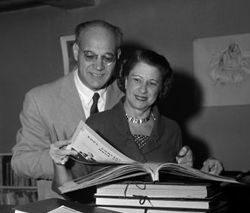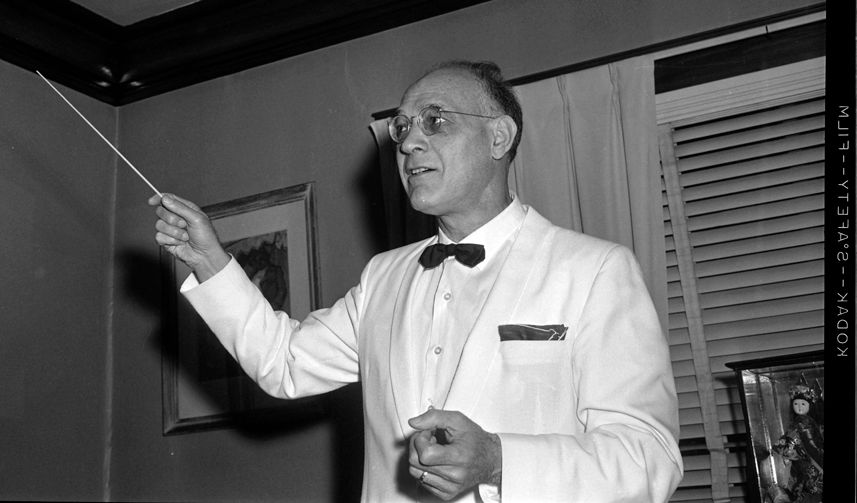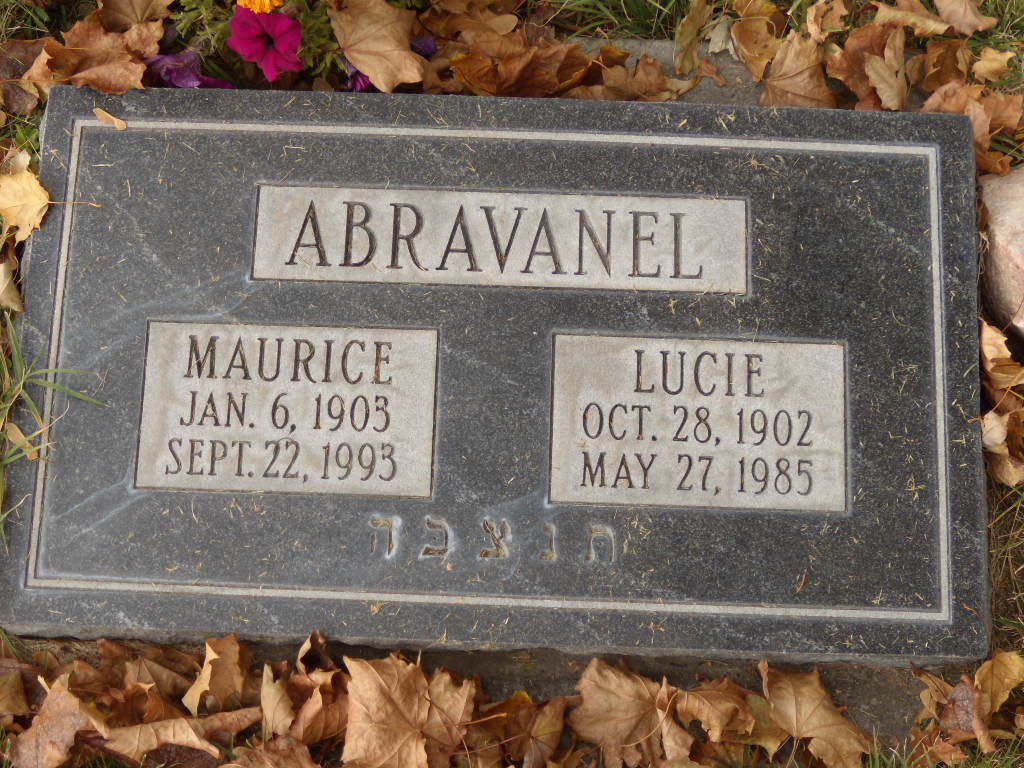By ALEX ROSS
Published: Thursday, September 23, 1993 in The New York Times
Maurice Abravanel, a conductor who led a long, colorful career on several continents and headed the Utah Symphony Orchestra for more than three decades, died yesterday in Salt Lake City. He was 90.
He died of natural causes, said Jeff Paris, director of marketing for the Utah Symphony.
Best known as the inexhaustible music director of the Utah Symphony, which he headed from 1947 to 1979, Mr. Abravanel did much to promote 20th-century American and European music, most notably through a series of recordings on the Vanguard label. He is best remembered for his long association with Kurt Weill and for his recorded cycle of the Mahler symphonies, which remains the only such cycle made entirely with an American orchestra. Conducting at 16
Descended from a long line of Sephardic Jews -- his roots can be traced back to Don Isaac Abravanel, the chancellor under Queen Isabella of Spain -- Mr. Abravanel was born in Greece in 1903. He grew up in Lausanne, Switzerland. His parents guided him toward a career in medicine, but thanks to the influence of the conductor Ernest Ansermet, a neighbor in his family's apartment building, he took up conducting at the age of 16. Moving to Berlin in 1922, he studied composition and performance with Kurt Weill, who was three years his senior. He thought Weill to be a "lousy teacher," but became his close friend and enthusiastic interpreter for two decades thereafter.
Entering the turbulent atmosphere of Weimar Germany, Mr. Abravanel moved in the circles of Weill, Bertolt Brecht, Paul Hindemith, and Bruno Walter. His German conducting appointments took him to Zwickau, Altenberg and Kassel; in 1930, he conducted a triumphant performance of Weill's "Mahagonny."
By the early 30's, he was guest-conducting at the Berlin State Opera, but as the Nazis rose to power in Germany, he took his career abroad. In 1933, he was music director for George Balanchine's Ballets 1933, leading the world premiere of Weill's "Seven Deadly Sins."
In 1936, on recommendations from Walter and Furtwangler, he became the youngest staff conductor ever at the Metropolitan Opera, where he made his debut with "Samson and Delilah." But his Met career lasted only two years, cut short by internal politics. He then conducted for several years on Broadway, leading first performances of Weill's "Knickerbocker Holiday," "Lady in the Dark," "One Touch of Venus" and "Street Scene." Building the Utah
In 1947, he took up the appointment at the Utah Symphony and began building a minor orchestra into a widely respected ensemble. Concert music was not an active feature of the state's musical life at that time, but Mr. Abravanel made it so, reaching out to rural communities and eventually making the orchestra so popular that Utah achieved the highest per-capita attendance at symphony concerts of any state.
Tellingly, he accomplished this with a repertory liberally stocked with 20th-century works, by Weill, Bloch, Honegger, Varese and his close friend Milhaud. Once he began his long and active recording career with Vanguard, he continued this emphasis, making the first recordings of Honegger's "Judith" and "King David." He also conducted ballet and opera, winning a Tony Award for his work in Marc Blitzstein's "Regina."
His Mahler cycle gave him the broadest fame of his career, perhaps owing to a psychedelic marketing strategy at Vanguard that once used the slogan "Mahler Is Heavy." But his interpretations were serious and well disciplined, somewhat too speedy for many listeners' tastes but a welcome contrast to the more flamboyant readings of Leonard Bernstein. This cycle is still the only one recorded entirely with an American orchestra.
He retired in 1979 but remained active in the musical world. In his final decade, he appeared every summer at the Berkshire Music Center at the Tanglewood festival in Massachusetts, teaching and serving as a generous mentor to younger musicians. Last summer, well past his 90th birthday, he was still attending concerts at Tanglewood and was seen laboring over the score of Stockhausen's "Gruppen."
Mr. Abravanel is survived by his third wife, Carolyn, whom he married in 1987, and by two sons, Pierre and Roger, both of Los Angeles.
By ALEX ROSS
Published: Thursday, September 23, 1993 in The New York Times
Maurice Abravanel, a conductor who led a long, colorful career on several continents and headed the Utah Symphony Orchestra for more than three decades, died yesterday in Salt Lake City. He was 90.
He died of natural causes, said Jeff Paris, director of marketing for the Utah Symphony.
Best known as the inexhaustible music director of the Utah Symphony, which he headed from 1947 to 1979, Mr. Abravanel did much to promote 20th-century American and European music, most notably through a series of recordings on the Vanguard label. He is best remembered for his long association with Kurt Weill and for his recorded cycle of the Mahler symphonies, which remains the only such cycle made entirely with an American orchestra. Conducting at 16
Descended from a long line of Sephardic Jews -- his roots can be traced back to Don Isaac Abravanel, the chancellor under Queen Isabella of Spain -- Mr. Abravanel was born in Greece in 1903. He grew up in Lausanne, Switzerland. His parents guided him toward a career in medicine, but thanks to the influence of the conductor Ernest Ansermet, a neighbor in his family's apartment building, he took up conducting at the age of 16. Moving to Berlin in 1922, he studied composition and performance with Kurt Weill, who was three years his senior. He thought Weill to be a "lousy teacher," but became his close friend and enthusiastic interpreter for two decades thereafter.
Entering the turbulent atmosphere of Weimar Germany, Mr. Abravanel moved in the circles of Weill, Bertolt Brecht, Paul Hindemith, and Bruno Walter. His German conducting appointments took him to Zwickau, Altenberg and Kassel; in 1930, he conducted a triumphant performance of Weill's "Mahagonny."
By the early 30's, he was guest-conducting at the Berlin State Opera, but as the Nazis rose to power in Germany, he took his career abroad. In 1933, he was music director for George Balanchine's Ballets 1933, leading the world premiere of Weill's "Seven Deadly Sins."
In 1936, on recommendations from Walter and Furtwangler, he became the youngest staff conductor ever at the Metropolitan Opera, where he made his debut with "Samson and Delilah." But his Met career lasted only two years, cut short by internal politics. He then conducted for several years on Broadway, leading first performances of Weill's "Knickerbocker Holiday," "Lady in the Dark," "One Touch of Venus" and "Street Scene." Building the Utah
In 1947, he took up the appointment at the Utah Symphony and began building a minor orchestra into a widely respected ensemble. Concert music was not an active feature of the state's musical life at that time, but Mr. Abravanel made it so, reaching out to rural communities and eventually making the orchestra so popular that Utah achieved the highest per-capita attendance at symphony concerts of any state.
Tellingly, he accomplished this with a repertory liberally stocked with 20th-century works, by Weill, Bloch, Honegger, Varese and his close friend Milhaud. Once he began his long and active recording career with Vanguard, he continued this emphasis, making the first recordings of Honegger's "Judith" and "King David." He also conducted ballet and opera, winning a Tony Award for his work in Marc Blitzstein's "Regina."
His Mahler cycle gave him the broadest fame of his career, perhaps owing to a psychedelic marketing strategy at Vanguard that once used the slogan "Mahler Is Heavy." But his interpretations were serious and well disciplined, somewhat too speedy for many listeners' tastes but a welcome contrast to the more flamboyant readings of Leonard Bernstein. This cycle is still the only one recorded entirely with an American orchestra.
He retired in 1979 but remained active in the musical world. In his final decade, he appeared every summer at the Berkshire Music Center at the Tanglewood festival in Massachusetts, teaching and serving as a generous mentor to younger musicians. Last summer, well past his 90th birthday, he was still attending concerts at Tanglewood and was seen laboring over the score of Stockhausen's "Gruppen."
Mr. Abravanel is survived by his third wife, Carolyn, whom he married in 1987, and by two sons, Pierre and Roger, both of Los Angeles.





